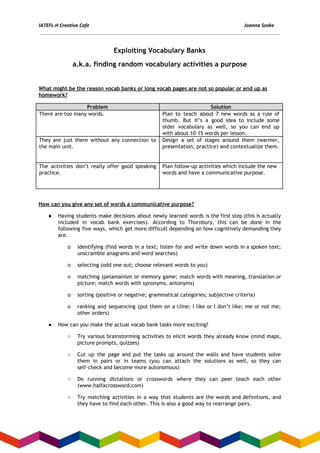
Creative ways to teach vocabulary
- 1. IATEFL-H Creative Cafe Joanna Szoke Exploiting Vocabulary Banks a.k.a. finding random vocabulary activities a purpose What might be the reason vocab banks or long vocab pages are not so popular or end up as homework? Problem Solution There are too many words. Plan to teach about 7 new words as a rule of thumb. But it’s a good idea to include some older vocabulary as well, so you can end up with about 10-15 words per lesson. They are just there without any connection to the main unit. Design a set of stages around them (warmer, presentation, practice) and contextualize them. The activities don’t really offer good speaking practice. Plan follow-up activities which include the new words and have a communicative purpose. How can you give any set of words a communicative purpose? ● Having students make decisions about newly learned words is the first step (this is actually included in vocab bank exercises). According to Thornbury, this can be done in the following five ways, which get more difficult depending on how cognitively demanding they are. o identifying (find words in a text; listen for and write down words in a spoken text; unscramble anagrams and word searches) o selecting (odd one out; choose relevant words to you) o matching (pelamanism or memory game; match words with meaning, translation or picture; match words with synonyms, antonyms) o sorting (positive or negative; grammatical categories; subjective criteria) o ranking and sequencing (put them on a cline; I like or I don’t like; me or not me; other orders) ● How can you make the actual vocab bank tasks more exciting? ○ Try various brainstorming activities to elicit words they already know (mind maps, picture prompts, quizzes) ○ Cut up the page and put the tasks up around the walls and have students solve them in pairs or in teams (you can attach the solutions as well, so they can self-check and become more autonomous) ○ Do running dictations or crosswords where they can peer teach each other (www.halfacrossword.com) ○ Try matching activities in a way that students are the words and definitions, and they have to find each other. This is also a good way to rearrange pairs.
- 2. IATEFL-H Creative Cafe Joanna Szoke ● Next is setting up the communicative follow-up activity which puts the target items into practice. Such activities should: o generate a genuine need to communicate (simply listening to the other as they speak, or just regurgitating a text won’t be sufficient) o have a context (decontextualized, fragmented sentences do provide some sort of practice but an activity with a meaningful context can help retention more) o imitate natural conversation (therefore, creating a dialogue overloaded with the target grammar will not result in a natural and meaningful communicative exercise) Some methods to create communicative activites Jigsaw or information gaps The aim is to exchange information about pictures in order to find differences or similarities. Student A uses (and explains) words they have on their sheet to their partner who most probably doesn’t know the word and vice versa. Using words creatively Select some words, set the theme and use them in a short story or a dialogue which then can be read or acted out. Actually, the more restrictions you give your students, the more creative they can be. Such activities promote retention in long-term memory, such as rehearsal, repetition and explanation. TBL (Task Based Learning) Students have to solve a problem or they have to agree on something by using the newly learned words. For example, if they are learning types of food, they should design the menu for a restaurant they’d like to open. Questionnaire/ survey Not all production tasks should start with writing. Ask your students to select some words and write questions with them which they can then ask from the others, collecting information and later reporting it. Make this task more comprehensive by actually asking them to create a report or a presentation from the answers they gathered. Role plays/ simulations Students act out different situations by taking up certain roles. Role cards can be designed to offer opportunities to practice e.g. a specific lexical set. What should you think about in general when teaching from vocab banks? ● Which items should I include? Are they relevant, are they challenging enough? ● How many items should there be? ● How will they be presented? ● What might be difficult about these items? How will I help students with these problems? ● What kind of meaningful communicative practice will they get? Sources: Gairns Redman: Working With Words, Scott Thornbury: How To Teach Vocabulary
